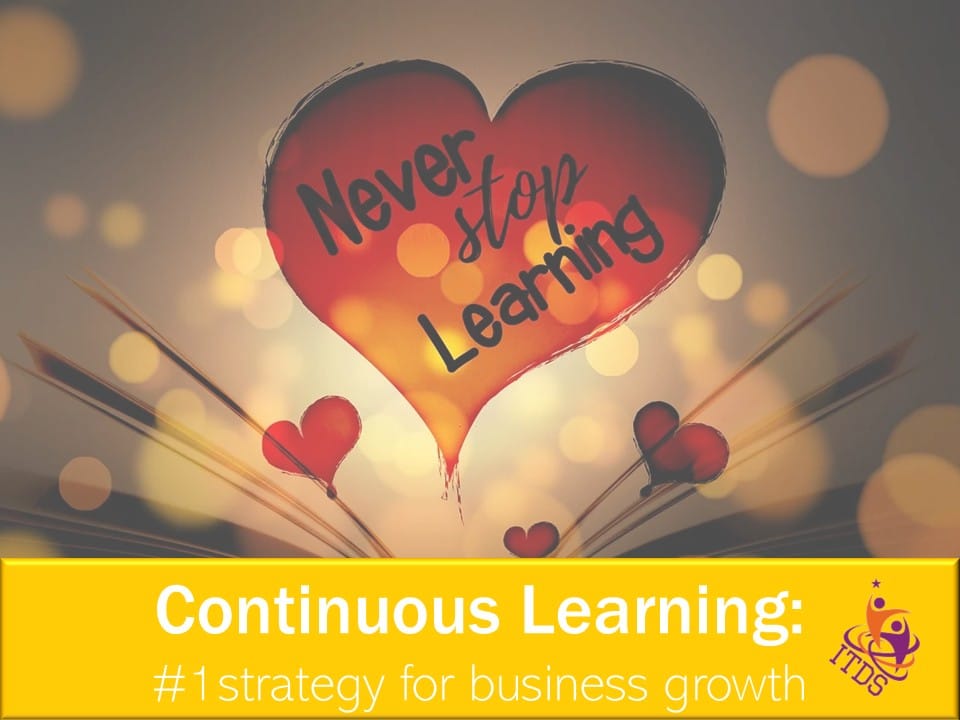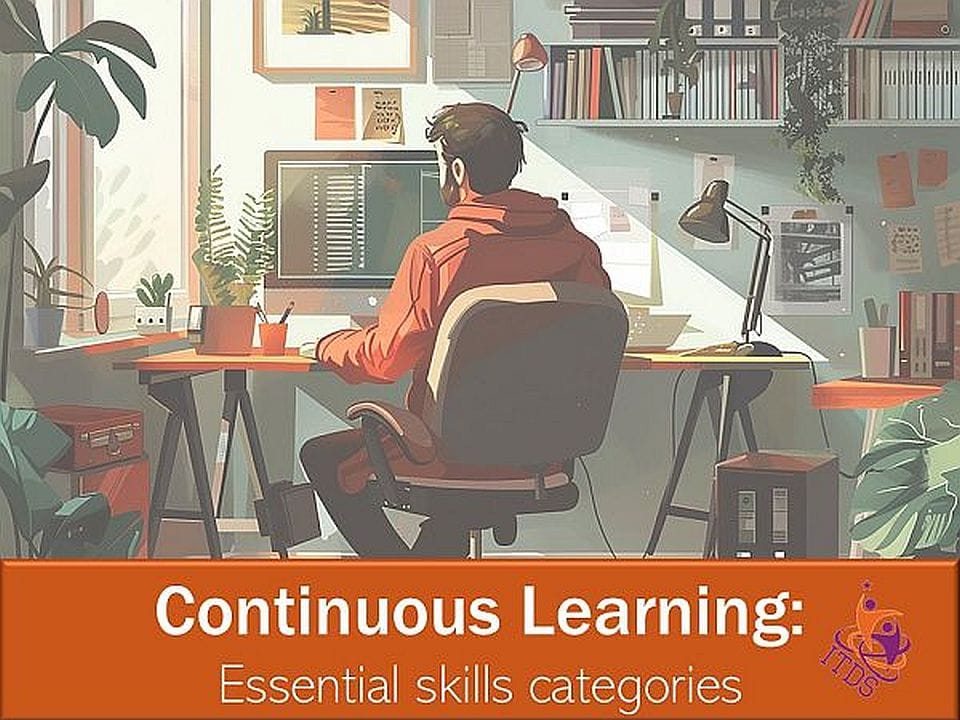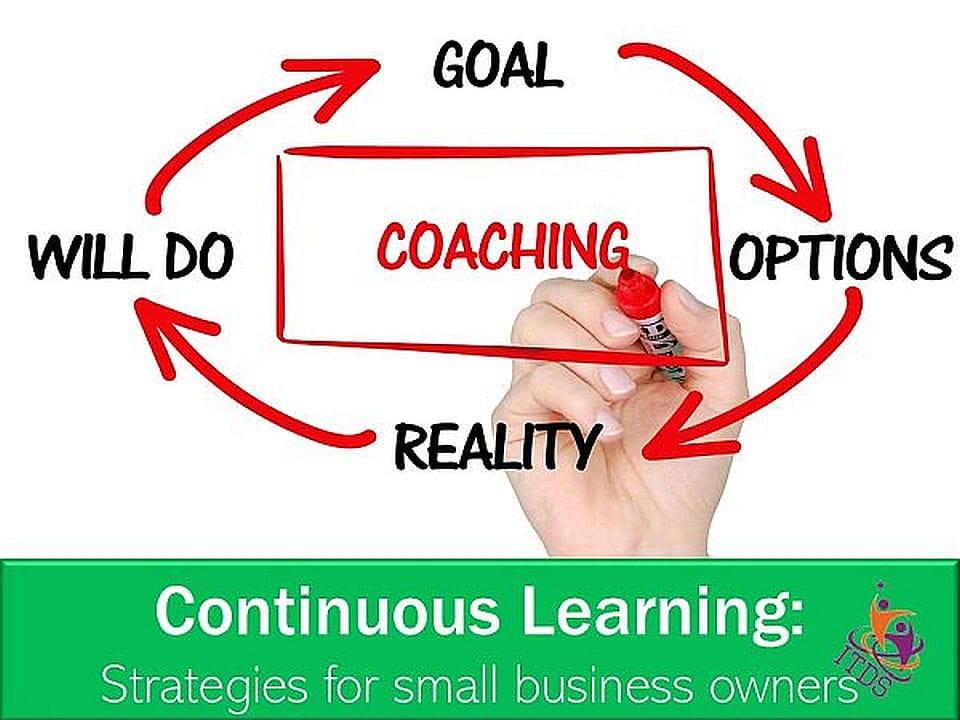Last updated on October 13th, 2025 at 10:33 pm
Continuous Learning: The #1 Strategy For Quality Business Growth
- Home
- Continuous Learning: The #1 Strategy For Quality Business Growth

If you know nothing else about me…please know that I am absolutely passionate about continuous learning for small business owners.
This was the main reason I established my business many years ago and it’s why that business is still relevant today.
You see, much of my passion is driven by this simple fact:
You can’t run a $50 million business with $5 million thinking or skills!
But however true that may be, however much I say it every chance I get, it does not stop so many of you from doing exactly that.
So in this post, I want to show you why continuous learning should matter to you and how you can go about doing it.
Hopefully, in this way, I can get you to become a member of the continuous learners posse.
Enough with the excuses!
Why continuous learning is important to small business owners
Generally, continuous learning can be defined as the ongoing process of acquiring new knowledge and or skills, either for your personal or professional growth.
In other words, it is learning that you may pursue for the pure joy of learning something new or for general skills-building.
For small business owners however, your continuous learning must be more focused and strategic. It must be about honestly identifying specific knowledge gaps that are holding your business back and systematically addressing them.
Therefore, when you acquire new knowledge, skills and insights, their value is in how you directly apply them to improve your business operations, engender adaptability and flexibility and drive business growth.
In reality, continuous learning is a skill in itself. If I may break it down for you, it involves:
1. Focusing on knowledge that can be immediately applied to your business challenges
2. Learning from multiple sources – customers, competitors, employees, industry trends
3. Implementing what you learn and measuring the results
4. Dedicating regular time to learning activities, despite your busy schedule
5. Building a learning culture within your business or organization
So what’s my point?
You must develop competencies in several key areas and constantly keep abreast of changes in these areas. And the smart way to do this is to commit to embracing continuous learning.
Benefits of Continuous Learning for Small Business Owners
Continuous learning offers several tangible benefits for small business owners.
Importantly, it helps small business owners to shift from reactive to proactive thinking, moving beyond day-to-day operations to building sustainable long-term success.
Here are some specific benefits for you to consider:
It leads to adaptation and resilience
For Example:
• Staying ahead of industry trends and market shifts
• Recognizing opportunities earlier than your competitors
• Developing greater flexibility in responding to business challenges
• Building resilience against economic downturns
You can achieve operational improvements
Such as:
• Discovering more efficient processes and systems
• Identifying and resolving business inefficiencies faster
• Implementing better financial management practices
• Making more informed strategic decisions
You can gain and maintain a competitive advantage
In several ways like:
• Differentiating your business through specialized knowledge
• Developing innovative products or services based on emerging trends
• Understanding and leveraging your business model
• Applying best practices from other industries to your business
Your personal growth and satisfaction is almost guaranteed
You will find yourself:
• Reducing business owner burnout through intellectual stimulation
• Building confidence in decision-making abilities
• Developing a growth mindset that extends beyond business
• Connecting with a community of like-minded entrepreneurs
Developing your team is easier and faster
In reality you will be:
• Equipping yourself to better train and develop employees
• Creating a culture of learning throughout your business
• Attracting talent who value growth opportunities
• Improving management and leadership skills
Essential Skill Categories for Small Business Owners

Now, I know the question you’re asking yourself and hoping I can answer is this:
Even if I wanted to engage in continuous learning…where would I begin?
Well, we know that every business has unique requirements, across industries and markets and every business owner has at least a little bucket list of things they want to learn.
But here’s the bottom line – sound knowledge in certain categories of skills will provide “unfair” advantage for entrepreneurs.
And while the ‘oh! I can outsource that!” mindset is prevalent, if you don’t have basic knowledge about what you’re outsourcing, it can be a disaster.
Therefore, consider focusing your learning efforts in these high-impact areas:
1. Financial Literacy and Management
Even with an accountant on your team, fundamental financial literacy remains non-negotiable for small business owners.
Key skills to develop:
• Developing a (your) business model
• Understanding how cash flows through your business and managing that flow
• Understanding financial statements (especially the difference between revenue and profit)
• Knowledge of pricing strategies especially the ones for your business/industry
2. Digital Marketing and Customer Acquisition
As marketing continues shifting toward digital channels, staying current with evolving platforms and strategies is essential.
Key skills to develop:
• An understanding of content marketing strategy
• How social media marketing works across relevant platforms
• How email marketing and automation work
• Customer journey mapping and optimization
3. Operations and Systems Thinking
Efficient systems create scalability and prevent the common small business trap of owner or leader dependence or founder’s syndrome.
Key skills to develop:
• Creating systems (by documenting and optimising processes)
• Basic project management skills
• Establishing quality control systems
• Inventory and supply chain management
• Time management and prioritization approaches
4. Technology Adaptation
While you don’t need to become a programmer, understanding key technologies affecting your industry provides crucial competitive advantages.
Key skills to develop:
• Basic data analysis
• Fundamentals of data security
• Industry-specific software proficiency
• Awareness of emerging technology (AI, blockchain, etc.)
5. Leadership and People Management
As your business grows, your ability to lead others becomes increasingly important.
Key skills to develop:
• Effective hiring and focused onboarding
• Performance management and feedback
• Team building and conflict resolution
• Delegation and empowerment
• Communication across different personality types
• Remote team management
6. Emotional Intelligence and Self-Management
Perhaps the most overlooked success factor, your ability to manage yourself, directly impacts business outcomes the most.
Key skills to develop:
• Recognising your own emotional triggers and patterns
• Understanding how your emotions affect decision-making
• Managing stress effectively under business challenges
• Adapting quickly to unexpected business changes
• Seeing situations from your employees’ perspectives
• Communicating clearly and effectively across different situation
Effective Continuous Learning Strategies for Small Business Owners

So, we’ve defined continuous learning as it relates to small business. We’ve also explored the benefits and really dived into some areas in which you should develop skills.
Now, it’s time for me to suggest some strategies to jump start your personal and professional development.
I really want to do this because without an organized approach, adult learning often results in information overload and frustration, rather than practical skills development.
Once you have identified where you want to start your learning, here are some simple strategies you can use:
Time-Efficient Learning Methods
1. Micro-learning sessions: In which you dedicate 15-30 minutes daily to focused learning rather than trying to find large blocks of time.
2. Learning during “dead time”: This is using audiobooks, podcasts, etc during commutes, routine tasks or the moments when there is dead time.
3. Two-prong approach: Combining learning with networking by joining mastermind groups or business owner associations, where you learn while building relationships.
Strategic Learning Focus
1. Problem-based learning: Identifying your most pressing business challenge and seeking targeted knowledge to solve it, rather than consuming general business content.
2. Customer-driven learning: Making a habit of asking customers what they want that you don’t offer, then learning those specific skills or knowledge areas.
3. Competitor analysis: Regularly studying what your successful competitors are doing and learning the skills needed to implement similar approaches.
Implementation Systems
1. Learn-implement-measure cycles: This when after learning something new, you immediately apply it in your business, measure the results, and adjust to suit.
2. Knowledge management system: Establish and maintain a central place (digital or physical) where you store insights, ideas, and lessons learned.
3. Teaching what you learn: Holding brief sessions with your team to teach what you’ve learned. This reinforces your understanding and helps you to share the knowledge as well.
Learning Communities
1. Mentorship relationships: Finding experienced mentors in your industry who can provide shortcuts to knowledge based on their experience.
2. Peer learning exchanges: Forming relationships with other growth-minded business owners where you share expertise in your strong areas and learn from their strengths.
3. Selective outsourcing as a learning approach: When outsourcing tasks, you structure the relationship to include knowledge transfer so you understand the process.
4. Accountability Partners: Teaming up with someone with who will help you hold yourself accountable for your own learning goals.
Your next “continuous learning” step
Aaahhh…There you have it!
A blueprint for implementing a programme for your own “business” continuous learning.
In case it isn’t clear to you what your next step should be…let me help you out.
Decide what you want to learn. You can choose from the list I have provided if you don’t have a topic of your own.
Apply any one of the learning strategies that best suits your circumstances or your personality and you’re on your way!
But hey, if you feel overwhelmed in any way, go ahead and contact me, I’d be happy to help.
